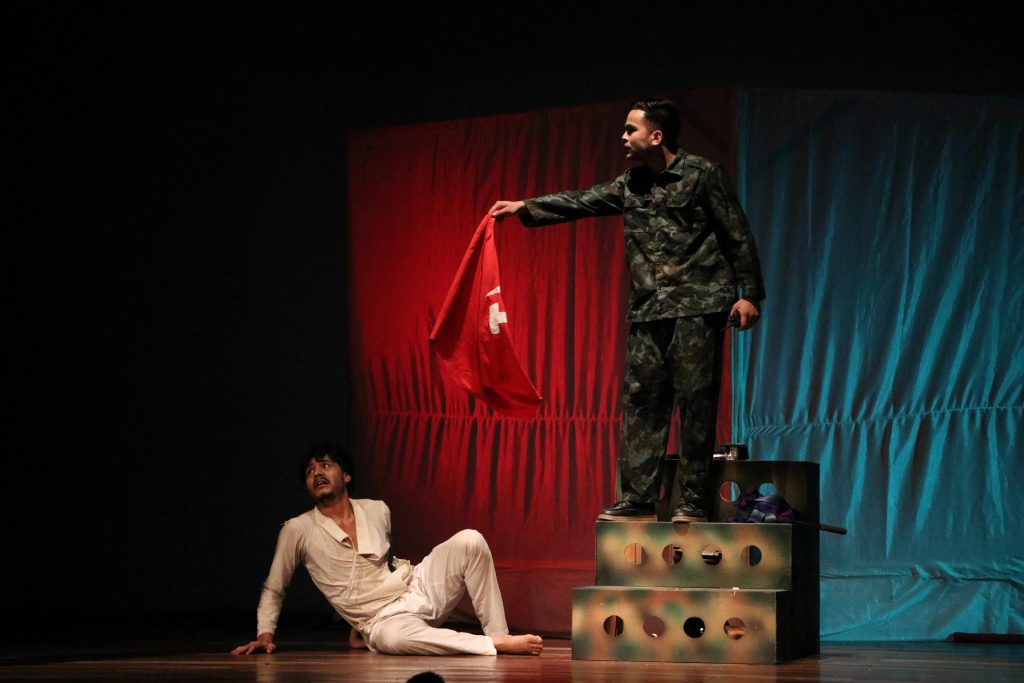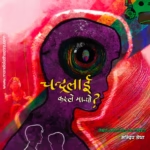In 2022, I was a member of a delegation that toured Kathmandu for a one-week-long training on negotiation skills organised by the US Department of Commerce in association with the AHEAD (Acceleration Higher Education Expansion and Development) project in Sri Lanka. The main purpose of this gathering was to have a week-long training session for the directors and managers of the University Linkage Office (UBL), which was established to manage and develop commercial linkages for university innovations. Although I was a part of this delegation, I had another mission to fulfil during this short visit to Kathmandu. Since I am a theatre scholar and an actor working in Sri Lankan theatre and films, I was interested in exploring how ‘live theatre’ is still a major entertainment and also an educational tool in Nepali society.
Nepal experienced a civil war carried out by the Maoist Party against the Nepali state. The war lasted ten years, killing nearly 17,000 people, and came to an end after the Nepali government signed a peace agreement with the Maoists in November 2006. The inception of Mandala Theatre lies within this social and cultural context, where theatre artists have intervened in the social transformation process after the long years of civil war. Mandala Theatre explores how theatre can be a mode of social transformation tool to heal the issues pertaining to civil war and social conflicts. Similar to the Sri Lankan civil war situation, Nepal had a long period of social unrest due to armed conflict between Maoist guerrillas and the government.
In Sri Lanka, the Liberation Tigers of Tamil Elam (LTTE) launched an insurgency against the ruling governments in the 1970s. The three decade insurgency caused the loss of lives from both parties and the public. As a result of the irradiation of the LTTE through military power, an important discussion came into being about whether the issues pertaining to armed conflicts could be fully resolved through military means. Applied theatre as a tool of social transformation and development began to be used in the social sphere with the support of Norway and other donor agencies. I believe that Mandala Theatre also germinated through a similar process while promoting peace and harmony among communities that have departed for years due to unjust war.
Mandala Theatre has launched its activities in social development and reconciliation during the past few years, bringing vital issues related to peacebuilding and enhancing understanding among communities that have departed due to political unrest and the civil war situation. Due to the country’s diversity in geography, communities, cultures, and regional languages, a theatre group that is working within this diversity also faces diverse challenges. Yet, Mandala Theatre has overcome these challenges by forming diverse groups of students enrolled in their school and graduating them to become professional and part-time workers in the field of theatre, where most of the graduates go back to their regional territories and practice theatre with their own rural communities.
Very recently, Mandala Theatre started working on establishing its theatre school, inviting young enthusiasts to learn the craft of theatre and related disciplines while selecting 20 to 25 students from the different regional areas of Nepal. The important point about Mandala Theatre is how they operate not only as a theatre collective focusing on social reconciliation and peacebuilding but also educating young theatre enthusiasts to use theatre as a social transformation tool. The theatre school of Mandala operates within this philosophical understanding and awareness of theatre as a tool for social change.
We, as practitioner-researchers at the Department of Theatre, Ballet, and Modern Dance, Faculty of Dance and Drama, University of the Visual and Performing Arts, Colombo, organize an annual students’ theatre festival. This theatre festival is a regular event on the academic calendar of the department for the last ten years. From the first year to the graduation year, students showcase diverse practices of theatre and dance supervised by the qualified academics of the department. As the director of the ATTF, I had no reservations when I contacted two theatre groups from Nepal and Manipur, India, to represent ATTF 2023. Mandala Theatre agreed to bring a theatre production produced by their students.
Mandala Theatre’s production Wounds of War was conceived and developed by the first batch of Mandala Drama school students, showcasing the agony and atrocities faced by Nepali society by abduction, killing, torture, and displacement due to the civil war. Mandala Theatre came with 12 actors and two academic leaders of the team. Som Nath Khanal led the team and coordinated the whole process of rehearsing and performing the production at Panibharatha Theatre, Colombo. On the second day of the ATTF 2023, Mandala Theatre staged their theatre works for the Sri Lankan audience, which included industry professionals, academics, students, and other theatre lovers.
This is the first time that an international theatre group has been invited to the ATTF at the University of the Visual and Performing Arts, Colombo. This international collaboration opened avenues for undergraduates and those pursuing postgraduate studies to experience the work ethics, social interventions, creative insights, and aesthetic applications of a regional theatre group. Interactions and engaging with a theatre group that works in the field of applied theatre enhanced the students’ ability to think and develop their social and emotional skills.
In addition to the Mandala Theatre’s debut performance at ATTF 2023, the team conducted a workshop on theatre and peacebuilding for students and Sri Lankan theatre artists. Workshop participants enthusiastically engaged in working with the Mandala team to explore various techniques and approaches to using theatre in the context of social reconciliation and peacebuilding. The actors encouraged theatre students to engage with issues related to ethnic cohesion and how to use theatre as a tool to enhance understanding between communities. This workshop was an important learning activity for the undergraduates who study applied theatre and how major theorists such as Augusto Boal and others have used theatre to promote social awareness and collective consciousness among people.
Mandala Theatre production, Wounds of War, ignited several discussions among theatregoers at ATTF 2023 in Colombo. One of the major concerns was whether Mandala Theatre Production was amateur or professional. This argument was discussed among theatre practitioners and students concerning the ways that Mandala production was executed in Colombo. As clearly stated, the production was a result of the devised theatre process carried out by the first batch of Mandala drama school students, and the eclectic ideas have been intertwined into a series of situations and enactments woven with the key thematic narrative. The theatrical aesthetic was employed to narrate the journey of the characters, and the production was somewhat similar to the semi applied theatre genre. I use this term, semi-applied, to denote the nature of execution within the framework of proscenium theatre.
Talking about the nature of applied theatre and development, Tim Prentki argues that applied theatre is different from unapplied theatre. According to her analysis, unapplied theatre is ‘pure theater, which is ‘theatre unsullied by contact with the vagaries and ambiguities of the world beyond the controlled environment of the formal theatre space’. Applied theatre therefore deals with issues beyond the formal and conventional theatre processes and disregards conventional aesthetic and artistic refinements. The discussion that I highlighted regarding amateur vs. professional germinates within this binary. However,
Mandala theatre work demonstrates how theatre could be both informative and entertaining while keeping the balance between conventions and applications.
The Department of Theatre, Ballet, and Modern Dance at the Faculty of Dance and Drama, University of the Visual and Performing Arts, Colombo, is working with Mandala Theatre to extend their curriculum activities and design the curriculum to cater for the new student enrolments. This engagement with the curriculum activities will pave the way for building a new venture for theatre education between the two institutions in the future.






